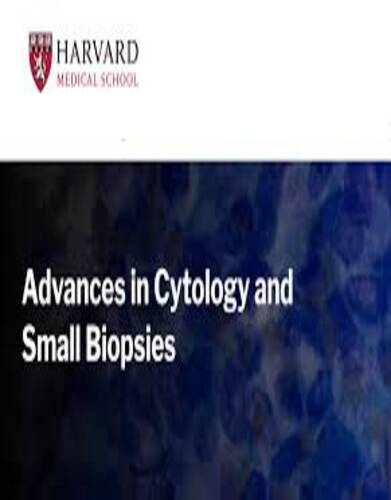The scope of cytopathology practice has grown increasingly complex in recent years with, for example, exposure to specimen types not previously sampled using cytologic methods and the introduction of new techniques such as endoscopic ultrasound-guided fine needle aspiration. Larger needles used in these procedures are procuring small tissue biopsies that provide material for advanced ancillary studies that are now under the purview of the diagnostic cytopathologist. “Advances in Cytology and Small Biopsies” will provide pathologists and cytotechnologists with a comprehensive overview of and update on diagnostic pathology utilizing a combination of cytology and small biopsy specimens. The emphasis will be on the role of the cytopathologist as a multifaceted pathologist combining light microscopic criteria with ancillary testing, including immunocytochemistry, biochemical testing and genetic analysis as they apply to diagnosis, prognosis and targeted therapy. Advances in automation and standardized terminology reporting will also be presented. The lecture format of our course is supplemented by question and answer sessions. The session at the end of each day will be an educational virtual microscopy case-based presentation focused complimentary topics and quality assurance issues applicable to all aspects of cytopathology. A syllabus of the talks will be provided in an electronic format.
The last edition of the course in 2019 was a significant update to the 29-year history of this course with HMS, including adding an emphasis on small tissue samples. Since 2019, the course has been on hiatus due to the COVID-19 pandemic. With the widespread adoption of virtual meetings, we are taking this opportunity to move to a new virtual distribution format for 2023. The 2023 course will capitalize on the tremendous success of the revamped 2019 course, which sold out 6 weeks in advance of the course dates. The advantage of the livestream format will allow us to greatly expand the registration capacity. We will be using faculty from the three major Harvard teaching hospitals- BWH, MGH, and BIDMC and bring in a world-renowned expert- Dr. Eva Wojcik- our keynote speaker- who will discuss urinary cytopathology and changes to the most widely adopted reporting system for urinary cytopathology- The Paris System 2.0 – that was updated in 2022. We will focus on the role of the cytopathologist in diagnosis using minimally invasive techniques and presenting updates on their role in utilizing ancillary testing for diagnosis, prognosis and targeted therapy for optimal patient care. Finally, we are updating the standardized reporting of pancreaticobiliary lesions with a brief review of the new WHO Reporting System for Pancreaticobiliary Cytology and our “Diagnostic Challenges and Lessons Learned” symposium with digitized virtual glass slides that will be available to registrants in advance of the course. Registrants will be able to submit their diagnosis prior to the case presentation at the meeting where their submissions will drive the discussion and teaching points.
Who Should Attend
Specialty Physicians
Primary Care Physicians
Cytotechnologists
Learning Objectives
Upon completion of this activity, participants will be able to:
Recognize the full range of diagnostic approaches to cytological and small tissue samples from all body sites.
Evaluate current and potential applications of automated screening, liquid-based preparation methods, flow cytometry and molecular testing.
Assess the impact of new technologies on cytology practice.
Apply current standards for the evaluation and work-up of cytology and small tissue samples for diagnosis, prognosis and targeted therapy.
Summarize the new standardized terminology and reporting systems for gynecological, pancreaticobiliary, thyroid, salivary gland and urinary cytological specimens.
Identify diagnostic pitfalls and how to avoid them.


